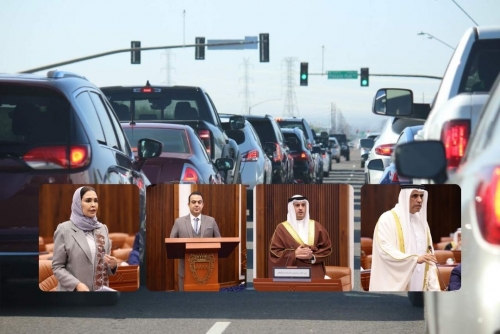No extra time for traffic offenders as Shura blocks proposal to extend fine payment deadline
TDT | Manama
Email: mail@newsofbahrain.com
Faced with over 470,000 traffic offences last year, Shura yesterday rejected a proposal to give drivers more time to pay reduced fines. The draft amendment, approved by MPs in February, would have extended the current seven-day window to 30, allowing offenders a longer period to pay half the minimum fine and avoid court proceedings. Backers of the proposal in Parliament argued that the extra time would help clear minor cases faster and take pressure off the courts. They said many drivers struggled to meet the one-week deadline, particularly given rising living costs.
System
Justice Minister, His Excellency Nawaf Al Maawda, defended the current system, which lets drivers pay half the minimum fine if they settle within seven days, the full minimum fine between days eight and 30, and at least a quarter of the maximum fine if the case reaches the Public Prosecution.
“By scrapping the seven-day tier, the law removes the step-by-step approach to penalties,” he said. “It means someone who pays straight away is treated the same as someone who waits a month. That isn’t fair.” The government objected to the change. So did the Shura Council’s Foreign Affairs, Defence and National Security Committee, which argued that stretching the deadline would weaken the purpose of the penalties, which are intended to correct behaviour early.
Bad driving
“Fines aren’t simply there to raise money,” said Dr Ali Al Rumaihi, who chairs the committee. “They are part of a system that stops bad driving before it turns deadly.” He noted that Bahrain’s roads are under strain, with more than 770,000 vehicles registered and over 17,000 new ones added in 2024. In June that year, 48 per cent of recorded accidents were serious. Speeding made up 28 per cent of traffic violations.
Misguided
Dr Jehad Al Fadhel, second deputy chairwoman of the Council, called the proposal misguided. She said settlements were meant to be quick and act as a prompt for drivers to rethink their behaviour, not a chance to delay consequences. “Settlement should not be mistaken for leniency in matters involving lives and property,” she said.
“If you stretch the timeline, you risk weakening the whole system.” She also pointed to the lack of supporting evidence. The number of traffic offences rose from 415,506 in 2022 to 473,563 in 2023, figures she said suggest that the current system is doing its job.
Safety
Committee rapporteur Ali Abdulla Al Aradi said the Traffic Law was one of Bahrain’s most important laws, touching both safety and everyday life. “Fines only work when they’re paid on time,” he said. “Letting them drag on takes the pressure off those who break the rules. The aim is to correct dangerous habits before they lead to something worse.”
He said the proposed amendment clashed with the intent behind Article 56, which was designed to encourage a quick resolution. The Council rejected the bill in principle and returned it to the lower house for further consideration.
Related Posts

